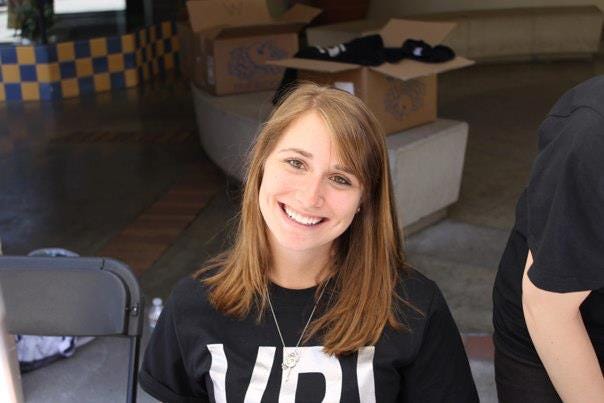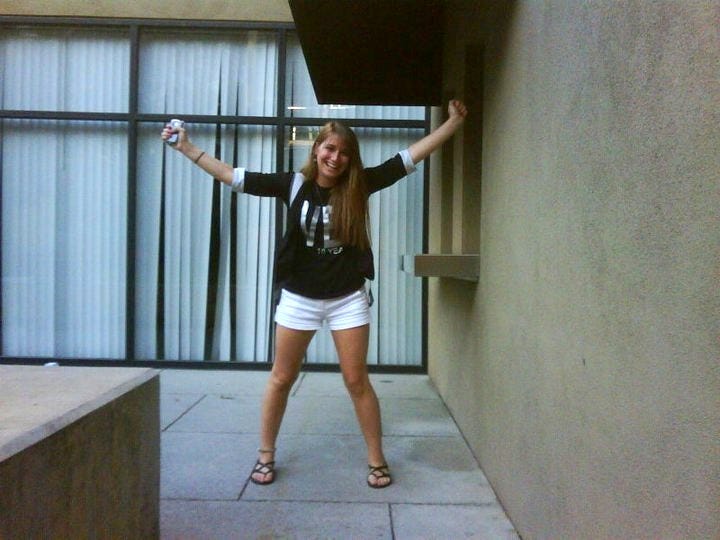VBI Family: Interview with Karlyn Gorski


Karlyn Gorski is currently a senior studying Public Policy and International Studies at the University of Chicago. She has interned at Chapin Hall at the University of Chicago, the Cape May Point Municipal Government, and the National Center for Policy Analysis. She debated for five years at Perkiomen Valley High school and qualified to the TOC three times, as well as winning the 2009 NCFL Nationals. She attended VBI as a student in 2008, and has returned as an instructor every year since 2010; this year will be her fifth consecutive summer working at VBI!
Tell us about your time abroad in India! What did you do, and what did you take away from the experience?
My time abroad in India was incredible! I studied South Asian Civilizations through a University of Chicago program, and also tutored 3rd grade students in math and English at a local elementary school. When I arrived, the school had no desks or electricity (they had gotten desks and a few lightbulbs installed by the time I left). I was also lucky to have the opportunity to do a lot of exploring, both around Pune where my program was based and around the country during breaks. Because of this freedom, I became close with some Indian college students; we still stay in touch, and they're coming to visit New York this summer! I also got to travel across a Northern state, Rajasthan, with my brother during a break. We took overnight trains and drank 5 rupee (~$.10) chai and ate an absurd amount of food. I wish I could go back and do it all again!
What was it like interning with the Cape May Point Municipal Government and the National Center for Policy Analysis? A lot of debaters like to reference roleplaying as policymakers- did you utilize skills you learned from debate while actually working for the government?
Interning at the Cape May Point Municipal Government was really cool, because I got to see the workings of local government on the ground. In public policy, we talk a lot about how different formulations of mandates produce different results, or why actors might have complex reasons for not complying with mandates. It was so fascinating to actually see those things in action. For example, Cape May Point is one of the smallest municipalities in New Jersey, so they faced some unique challenges in complying with affordable housing quotas. I got to research affordable housing policy in New Jersey, but I also got to do some more fun tasks like driving around the community to make sure all houses had their addresses posted. I got to see every single house in the municipality, which was neat because my parents raised me to be a big architecture nerd.
Working at the National Center for Policy Analysis was really interesting, because I found that my personal beliefs didn't always align with the work I was given. My debate skills definitely came in handy here. For one, debate teaches us that there is no single right answer to most questions. We have to abandon our biases and find the best arguments on both sides of the issue. That was really helpful in completing my assignments even if I disagreed with some of them. Second, debate helps us find ways to defend things we might not initially find appealing, by constructing nuanced arguments or ways of defending our side of the resolution. This was really useful when I was given more open-ended assignments because I would find ways to complete them that did align with my beliefs. Overall, it was an experience that really helped me understand what it's like to be a public policy researcher.
Tell us about your work doing research last summer! Was it similar to doing research for debate?
Last summer, I got to work at Chapin Hall at the University of Chicago as part of a research team that analyzed the implementation of a new health and wellness policy in Chicago Public Schools. As debaters, we analyze policies a lot, and it was really exciting to get to do that for real. My team conducted interviews and surveys, and we dug through all of that data to produce a few themes of successes and challenges of the ongoing implementation of the program. It was funny because it was a lot like grouping arguments -- I'd hear one principal talk about how students get excited for exercise breaks, and another talk about how students love gym class, and group them under something like "success: enthusiasm for activity". We would then take the successes and challenges and offer recommendations for using/improving them. That part was kind of like developing a plan text. Overall, the analysis skills that debate helped build were really crucial to my success in that job.
You've been very involved with public education and social justice. What shaped your interest in those fields? Do you think debate has a role to play in improving public education?
When I first got to college, I knew I wanted to do something that would "make a difference". I was interested in India, so I figured that's where I would work to make a difference; the country faces extreme poverty and economic inequalities, injustices against women and minorities, and government systems like schools and welfare offices that have serious room for improvement. But when I actually went to India, I realized that I wasn't in the best position to make a difference there. I don't speak any of the languages that many people feel most comfortable using, my obvious foreignness made it difficult for people to speak frankly with me, and I'm not used to a lot of the cultural norms. For example, I learned that Americans say "thank you" all the time compared to Indians, which made some of my friends feel uncomfortable because it made me seem too formal. When I returned to Chicago from India, I took a class called the Public Policy Practicum that had me conduct survey and interviews with parents and students at a local elementary school. That's when I realized that in Chicago, I can make a difference. Chicago, like other cities across the US, faces many of the same challenges facing India. But here, I do speak the language, I do understand the cultural norms, and I have a better understanding of the problems that people experience. That's when I realized that I'm really interested in improving public education and working for social justice in America: this is where I'm best-equipped to actually enact change. Next year, I'm hoping to do just that as a full-time intensive math tutor in Chicago Public Schools. My program, Match Corps: Chicago works with at-risk 9th and 10th grade boys to improve their math skills. Since I have a caseload of just 12 students, I get the chance to work with them in a very personalized way. Math is one of the classes most likely to make someone drop out of high school, so the idea is that this intensive tutoring can help students feel more comfortable with mathematical concepts. Early results from the program are really promising -- students learn in 6 months the equivalent of what they'd learn in three years of regular classroom teaching, their grades go up, their attendance improves, and they're suspended and arrested less. The study is still ongoing, and I'm really excited to be a part of such an innovative program.
I definitely think that debate has a role to play in improving public education in America. To succeed in the 21st century, having strong analytical and critical thinking skills is crucial. Unfortunately, most of our high schools fail to teach those skills. Ultimately, this means that we need to make some changes to our schools, but in the meantime, I think that debate can do a lot to fill that gap. On top of analytical and critical thinking skills, debate teaches other things necessary to succeed in college and the workforce like public speaking, research, writing, creativity, and adaptability. We need to continue to support middle school debate programs, UDLs, public school teams, accessible and affordable tournaments, scholarships, and freely available resources online like backfiles, videos, briefs, etc. Debate was the single most significant thing I did in high school, and arguably in my whole life. Nothing else taught me as many useful and important skills. More students deserve the chance to learn in the unique ways that debate entails.
What is your favorite memory from VBI?
My favorite memory from VBI is more of a series of memories -- the women in debate discussions over the years. I remember my first year out, when it was considered really weird or unnecessary to discuss the challenges facing women in the community. Now, students seek us out to ask when it will be. We host multiple discussions with various groups of individuals and various different themes. It's been so exciting to see support for women and minorities in debate grow over the years
If you could give one piece of advice to a young debater, what would it be?
To young debaters: stick with it! I know it's so cliché, but winning is really not what matters about debate. What do matter are the skills you learn from it. Every time you lose a round, it means you researched a topic, wrote cases, presented your position, and answered at least some of your opponent's arguments. That's awesome!!! When I got to college, I had to take a mandatory writing seminar in which we learned about claims and warrants. It took some students weeks to understand those concepts, but because of debate, I already did. While many of my friends agonize over papers for weeks, I've written a 20 page paper in two days. Almost all of my professors compliment the "clarity" of my argumentation. It's not because I'm the best researcher or writer: it's because I spent my high school years practicing these skills through debate. There's no better way to prepare yourself for college or jobs than to keep debating -- even (especially) when you lose




